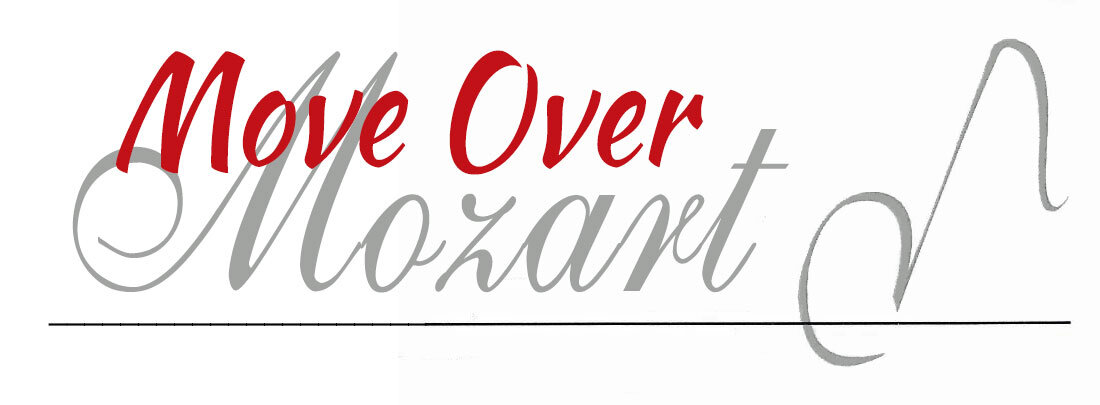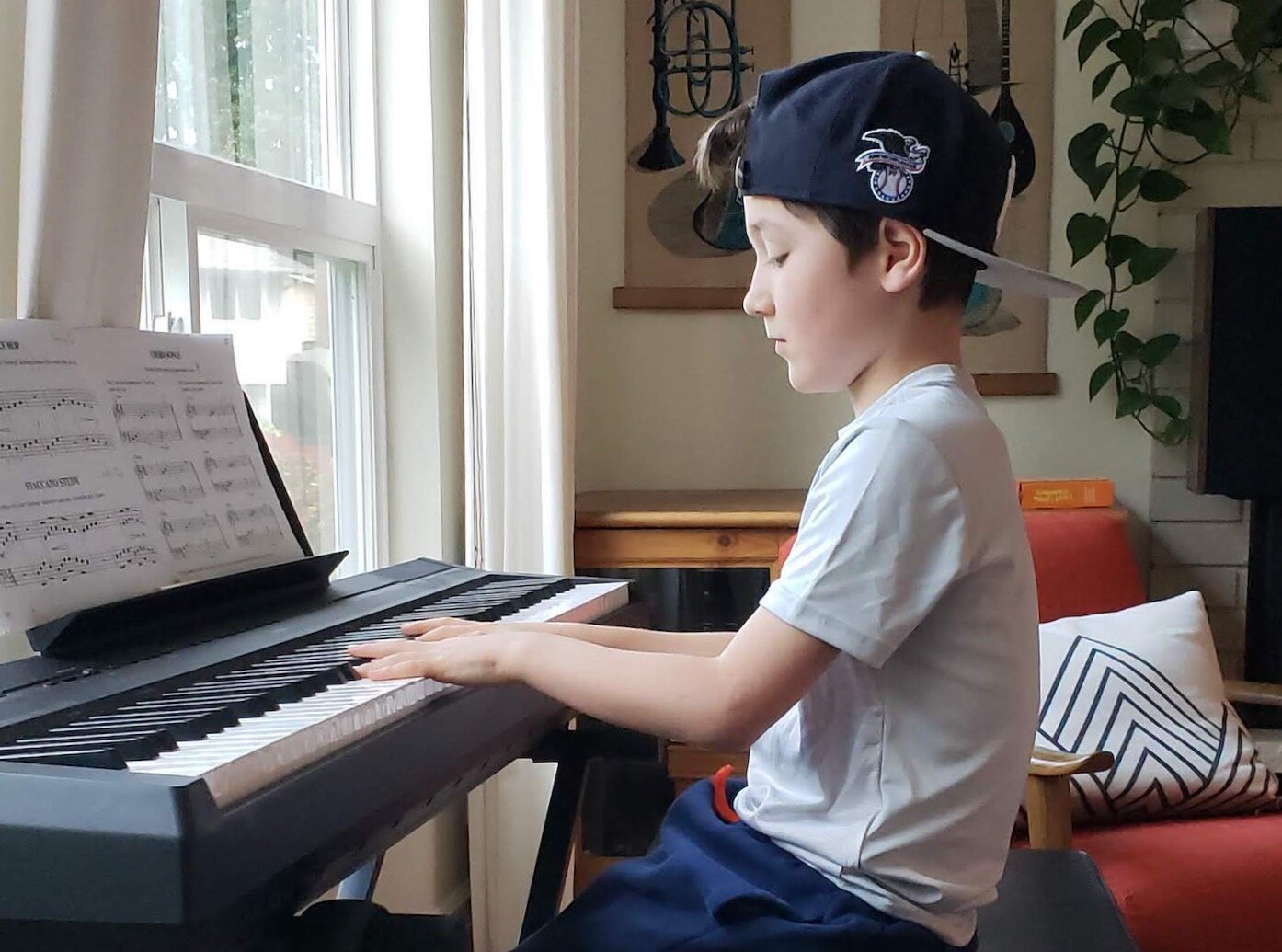Mozart’s Monthly Memo - Volume 7
Mozart's Monthly Memo-Volume 7
March 30, 2021
Hello!
Like our new logo?
Our feature article this month is about the best piano practice techniques.
Also included:
Student showcase of Lieto
Upcoming MOM events includes our next "Crescendo Kids Online" class
Parents Ask Pam - What is the best piano class for a beginning 6 year old and 10 year old?
Feature Article: Beyond Practice - Make Piano Time Fun & Rewarding for Kids (Part 1 of 2)
“I hated practicing!” Is a comment I hear frequently from adults lamenting why they didn’t continue learning to play an instrument. And because they had such a negative experience, they don’t want their child to have that negativity either. But at the same time, they regret not taking more lessons as a child and they don’t want their child to have that same regret. Isn’t it fun being a parent!
Yes, practicing is important. The more your child practices, the more they will get from their music lessons. Is practicing necessary? It depends on your end goal. If you want your child to learn a little about music and don’t care if they ever play well, then no, practicing is not necessary. (Yikes! Don’t tell your piano teacher I said that!) However, your child will benefit ten-fold if they just practice 5-minutes daily! In addition to learning music, they will also have more brain development, get higher marks in other subjects in school, and be more likely to be successful in whichever career path they embark on. But you already knew that! So how do you encourage your child to practice daily but keep it motivating and exciting at the same time?
First, let’s stop calling it PRACTICE! It is PIANO TIME, and it means so much more than just playing the same piece over and over. Let’s also have an “environment” that is more music-friendly. Have a daily time to play the piano. Better yet, have several times during the day to play the piano, sort of like brushing your teeth. If it is part of your routine it will be easier to remember. After breakfast, after brushing your teeth, after snack time, and after school, are all examples of when piano time could be part of your routine. Once at the piano, let your child decide what to play and how long. Have the piano easily accessible without interfering with other activities. In other words, don’t put the piano in the cold basement and don’t put the piano in the same room as the TV.
Parent involvement will change as your child grows physically and musically. How much or how little will depend on your relationship with your child, who your child is, and how they learn. Parents should plan to assist with practicing, no matter what their age, for at least their first year of lessons. In addition to establishing guidelines on how to practice, this will also let your child know that you consider piano lessons important and want your child to succeed.
The most important part of practicing is staying engaged and focused. It isn’t about the time spent practicing, but rather about the focus and brain engagement while practicing. In no particular order, here are 8 of 21 practice activities that can be used to encourage more engagement but also keep it fun. (Stay tuned for the rest of the practice activities in next month’s Memo.)
Practice several times a day for shorter periods of time. Studies show that spending just a short time, less than 5 minutes on a difficult passage is best. Something about focus, engagement and keeping it new. Once you are tired of practicing a section, move on! You can always come back to it later.
Play each song or section of music at least 3 times in a row. Repetition is the key here. But be careful! If you play it wrong three times, you have just reinforced all the mistakes!
Practice slow enough to play it “perfect.” “Perfect” can mean just correct notes. As the student progresses, add rhythm and then dynamics to the “perfect” definition.
Break harder or longer pieces into smaller sections. Sometimes the smaller section is a line, sometimes it is just two beats. But you want a small enough section to be able to play it “perfect.”
Set a goal for each practice session. This is way better then setting a timer! The goal can be to play this section 3 times without wrong notes, or to play this part very quietly. Whatever the goal, make sure it is small enough to be able to accomplish in about 5 minutes. If it is accomplished in one minute, make another goal. If it seems like it will take longer than 5 minutes, adjust the goal a bit and tackle the longer goal another day.
Have practice time be a “special one-on-one time” with a parent. It doesn’t matter if the parent is musical or not. Just having someone sit and listen can be hugely encouraging to a student. My 15 year old daughter wanted me to sit with her as she practiced, just in case she had a question. She never did, unless I got up to do something else!
Listen to live music whenever possible. There is something invigorating about listening to live music! It will foster motivation better than any reward system!
Listen to recordings of music being learned, or music that could be learned in the future. Listen to jazz or classical piano. This is HUGE! For my youngest, preschool-aged students, it wasn’t having a piano at home that made the difference, it was whether or not they listened to classical music regularly. We imitate what we hear, and when you listen to quality music daily, it will make you a better musician!
What practice techniques have you used in your family, either as a parent or as a student?
Student Showcasing
Ideally, each week we showcase a different student from our classes. I will do better to showcase more students next month! Thanks to Lieto for sharing his music with us! Like us on Facebook to see the new student each week.
Lieto, age 6, student of Miss Pam, performing Princess or Monster?
Upcoming MOM Events
We have a NEW name for our online piano class - drum roll please . . . .
Crescendo Kids Online
Once we start having physical classes again, they will be called Crescendo Kids Classes
We are also getting a NEW website in April. We are so excited!
FREE Online Piano Party! Students share their own music as well as participate in musical games, creating music and learning some music history. Each party is a little different with a theme and a special guest. Next month our special guest is the Mirudangam, an Indian drum! Come, meet our piano teachers, play some music, and have fun! All ages and musical levels are welcome. Parties are available to non-students, former students as well as current students. Click the link to sign up.
Piano Party Sign Up
Saturday, April 24, at 11:00 am. RSVP required.
Parent Information Meetings - Have questions about our online piano class program? Want a tour of our practicing app? Click the link to schedule your meeting with Miss Pam.
April's Crescendo Kids Online begins Tuesday, April 6. This is a great way to start your child's musical education and begin or continue piano lessons. Students are put into one of 4 classes depending on their age and musical ability.
Pre-Reading - Ages 3 - 5 years, or students not yet reading,
We use a color-coded method for the students to match their five fingers to five keys on the piano. New songs using only those 5 notes are given each week.
Primary - Ages 5 -7 years or older and brand new to music,
This group is for the very basics of piano playing. Students learn to play simple rhythms, correct hand position, and the names of the white keys on the piano.
Beginning Elementary - Ages 7-12 years or younger and reading notes,
This is for students just starting to read notes on the staff. Students are taught how the staff relates to the piano and how to translate the notes to making music. Also, having the students memorize a few key notes on the staff will help greatly with their ability to read music.
Advanced Elementary - Ages 7 - 12 years with previous piano lessons
This group already reads notes on the staff and can immediately identify many of the notes by name. They will learn more advanced technique and music theory beyond the initial basics of learning to play.
Parents Ask Pam
Have a question for Miss Pam? You can email, text message, or message on Facebook your questions. She will respond immediately to you, and your question might be featured in future newsletters.
Q: I have a 6 year old and a 10 year old, both have never taken piano lessons before. Which program do you recommend?
A: I would definitely recommend Crescendo Kids Online for both kids. It is a great program to introduce children to piano lessons and ease them into the rigor of practicing daily. Although they are both beginning piano students, they will each learn at a different pace because of the difference in their ages as well as the fact that they are different people. Also, your 10-year old has probably had more music in their regular schooling, which would have them starting at a different place than your 6-year old. Crescendo Kids progresses at the pace your child sets and the lessons will be tailored to each one's specific needs. We can start with an assessment lesson for both of them to confirm what music they may already know and to decide which books would be best to start each of them in. Once they seem ready for something more challenging, you can always transition to private lessons. I suspect your older child will be ready for private lessons within the year.
Your Comments And Questions
We want to hear from you! Please visit our Facebook page to leave your comments.


